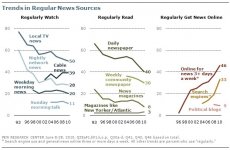David Baxter PhD
Late Founder
We Only Trust Experts If They Agree With Us
by Christie Nicholson, Scientific American
September 18, 2010
We only consider scientists to be experts when their argument is in line with our own previously held beliefs.
We think we trust experts. But a new study finds that what really influences our opinions, more than listening to any expert, is our own beliefs.
Researchers told study subjects about a scientific expert who accepted climate change as real. Subjects who thought that commerce can be environmentally damaging were ready to accept the scientist as an expert. But those who came into the study believing that economic activity could not hurt the environment were 70 percent less likely to accept that the scientist really was an expert.
Then the researchers flipped the situation. They told different subjects that the same hypothetical scientist, with the same accreditation, was skeptical of climate change. Now those who thought that economic activity cannot harm the environment accepted the expert, and the other group was 50 percent less likely to believe in his expertise. The study was published in the Journal of Risk Research.
The investigators found similar results for various other issues, from nuclear waste disposal to gun control. Said one of the authors, ?People tend to keep a biased score of what experts believe, counting a scientist as an 'expert' only when that scientist agrees with the position they find culturally congenial."
by Christie Nicholson, Scientific American
September 18, 2010
We only consider scientists to be experts when their argument is in line with our own previously held beliefs.
We think we trust experts. But a new study finds that what really influences our opinions, more than listening to any expert, is our own beliefs.
Researchers told study subjects about a scientific expert who accepted climate change as real. Subjects who thought that commerce can be environmentally damaging were ready to accept the scientist as an expert. But those who came into the study believing that economic activity could not hurt the environment were 70 percent less likely to accept that the scientist really was an expert.
Then the researchers flipped the situation. They told different subjects that the same hypothetical scientist, with the same accreditation, was skeptical of climate change. Now those who thought that economic activity cannot harm the environment accepted the expert, and the other group was 50 percent less likely to believe in his expertise. The study was published in the Journal of Risk Research.
The investigators found similar results for various other issues, from nuclear waste disposal to gun control. Said one of the authors, ?People tend to keep a biased score of what experts believe, counting a scientist as an 'expert' only when that scientist agrees with the position they find culturally congenial."


